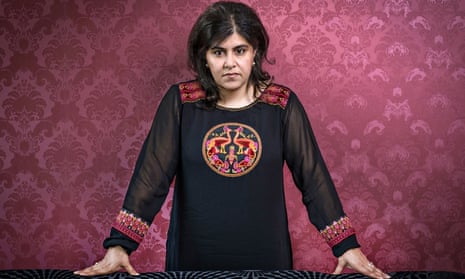Lady Warsi has delivered a blistering critique of the government’s approach towards Britain’s Muslims, warning that failure to engage properly with communities across the UK has created a climate of suspicion and undermined the fight against extremism.
In her first major intervention on the relationship between Muslims and the rest of society since she resigned from the cabinet five months ago, Warsi says the coalition’s policy of non-engagement has caused deep unease and resentment towards the government.
Writing in the Observer, Warsi warns that the government’s stance is counterproductive at a time of heightened national security. This month has seen warnings from MI5 that an attack on the UK is “highly likely” in the wake of the Charlie Hebdo massacre in Paris on 8 January.
In a series of stinging judgments, Warsi, a former chairwoman of the Tory party and the first Muslim to serve in the cabinet, claims that:
■ The government in which she served has come “to view ever-increasing numbers of Muslim organisations or individual Muslim activists with suspicion”.
■ David Cameron rejected requests for other faiths, including Muslims, to be given an equivalent to the annual meeting he has with the Jewish leadership – a meeting of Jewish groups and figures that the prime minister hosts.
■ Former colleagues in government have failed to show proper concern for the “worries and fear” felt by Britain’s 3 million-strong Muslim community in the current febrile atmosphere.
Warsi also condemns the lack of ministerial engagement with a cross-government working group combating anti-Muslim hatred, in which she was involved. Chief whip Michael Gove is singled out for particular criticism for his behaviour during the Birmingham schools Trojan horse affair, when Warsi claims he flatly rejected formal requests from the working group to become involved.
Warsi reveals that there were deep splits within the cabinet over its non-engagement policy. Justice secretary Chris Grayling is cited as one senior figure who believed non-engagement was counterproductive in tackling extremism. She states that the government’s decision to deal with only a very small number of British Muslims meant that community-based engagement – seen by many counter-terrorism experts as the most effective way to tackle radicalisation and extremism – fell by the wayside.
The government’s response to the dangers of extremists was reduced, she writes, to a “dangerously narrow engagement… a dozen people for a community of over 3 million”.
Warsi decided to speak out after communities secretary Eric Pickles wrote last Monday to more than 1,000 Islamic leaders calling on British Muslims to “explain and demonstrate how faith in Islam can be part of British identity”.
Pickles also said that he was proud of the way British Muslims had responded to the Paris terror attacks, but the letter was condemned by sections of the Muslim community. Pickles was accused of treating Muslims as in some way “apart” from the rest of British society. Warsi says this reaction graphically illustrated the gulf that has grown between the coalition government and Muslims.
She says: “The reality is if you haven’t cultivated a friendship, if you haven’t fostered trust, then a letter out of the blue to a mosque… with whom government has refused to engage creates a climate where even the most benign of correspondence can become toxic.”
Warsi resigned as a senior Foreign Office minister in August last year, citing the government’s “morally indefensible” policy on Gaza. Her decision was seen as a heavy blow to Downing Street while bolstering her following among British Muslims, although she has waited until now to publicly share her frustrations over the government’s domestic approach to extremism.
“We needed to bring more people into the fold rather than increasingly adopt positions which pushed groups and individuals out to the fringe,” she says.
The government’s strategy towards the Muslim community meant links that might have helped combat extremism and tackle radicalisation have fallen away. Recently, the former head of MI5, Baroness Manningham-Buller, expressed doubts about plans to harden counter-terrorism laws warning that counter-radicalisation had to be led by moderate Muslims.
Warsi says: “We will all fight extremism better if we all feel like we are all in the same team.”
She voices her frustration at the refusal by the coalition to establish a Muslim equivalent of the Jewish Leadership Council (JLC) which arranges for community figures to share their views directly with the prime minister.
“I’ve argued for a long time that the prime minister should hold a similar event with Britain’s other major faith communities, but sadly this has not been forthcoming,” she says.
She also criticises the attitude of government ministers towards the cross-government anti-Muslim hatred working group, set up in 2012 to ensure Islamophobia receives the same support as previous campaigns to tackle antisemitism, anti-black racism and homophobia.

Comments (…)
Sign in or create your Guardian account to join the discussion